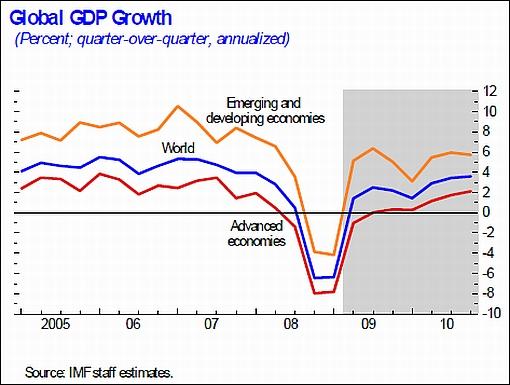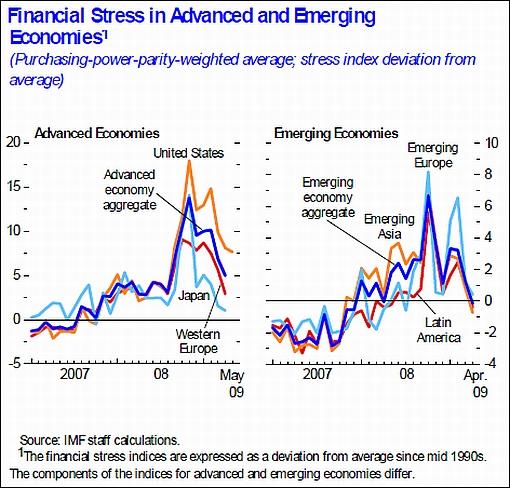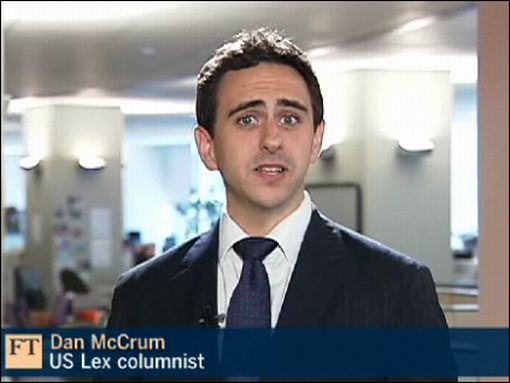Correcting Stock Market Calls for Second Economic Stimulus
Stock-Markets / Financial Markets 2009 Jul 12, 2009 - 10:09 AM GMT As I reluctantly start packing my bags after a most enjoyable two weeks of R&R in Europe (see my posts on Slovenia and Switzerland), “Words from the Wise” comes to you a bit more cryptically than usual. However, a full dose of excerpts from interesting news items and quotes from market commentators is included.
As I reluctantly start packing my bags after a most enjoyable two weeks of R&R in Europe (see my posts on Slovenia and Switzerland), “Words from the Wise” comes to you a bit more cryptically than usual. However, a full dose of excerpts from interesting news items and quotes from market commentators is included.
Despite having crisscrossed Heidi’s country, I have yet to find the elusive Swiss gnomes to glean what they make of financial markets at this juncture. Meanwhile, the past week has been characterized by a fresh wave of risk aversion, as uncertainty over the global economic outlook took its toll on stock markets, commodities and precious metals, and investors favored safe-haven assets such as government bonds and the Japanese yen.
The S&P 500 Index, Dow Jones Industrial Index and the Reuters/Jeffries CRB Index - all now in corrective mode - closed down for a fourth consecutive week, while US Treasuries recorded gains for a fifth straight week and the Japanese yen for four out of the past five weeks.
The yen is often seen as a global barometer of risk aversion. The graph below demonstrates the strong inverse relationship between the movements of the yen (against the euro, in this case) and those of the Dow Jones World Index. As shown, a falling yen indicates risk tolerance (and a willingness to buy risky assets) and a rising yen shows risk aversion (and an indisposition towards risky assets). A downturn in the yen exchange rate could be a good indicator to keep an eye out for confirmation of better times ahead for stocks and commodities.
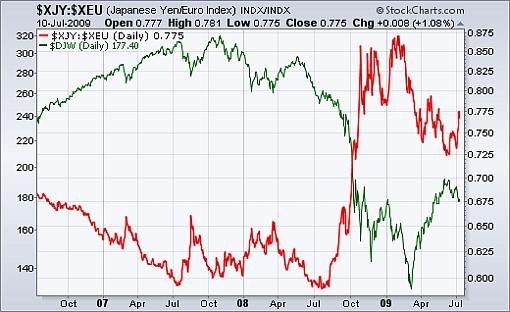
Source: StockCharts.com
Also featuring prominently in investment discussions during the week were the viability of the Public-Private Investment Program (PPIP) and the merits of a second stimulus package - calls for this comes at a time when estimates of trillion-dollar fiscal deficits and unsustainable debt levels are raising inflation expectations and putting upward pressure on long-term yields, thus partly undoing the Fed’s monetary easing.
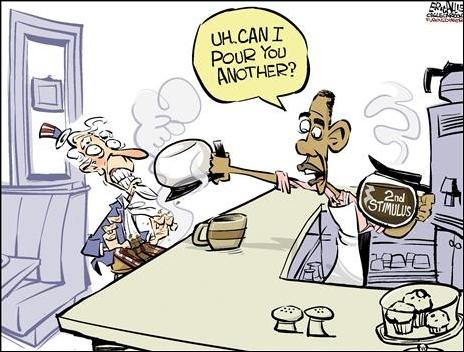
Source: Eric Allie, July 8, 2009.
The past week’s performance of the major asset classes is summarized by the chart below - a set of numbers that indicates risk aversion is creeping back into financial markets.
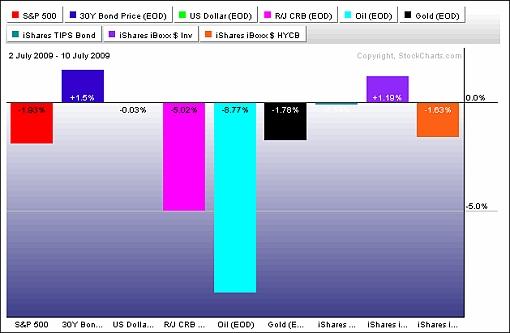
Source: StockCharts.com
A summary of the movements of major stock markets for the past week, as well as various other measurement periods, is given below. As the second-quarter earnings results in the US start rolling in, the American and most other markets closed the week in negative territory, with the Shanghai Composite Index being one of the few major benchmarks to make headway.
With the exception of the Nasdaq Composite Index, the major US indices are all back in the red for the year to date.
Click here or on the table below for a larger image.
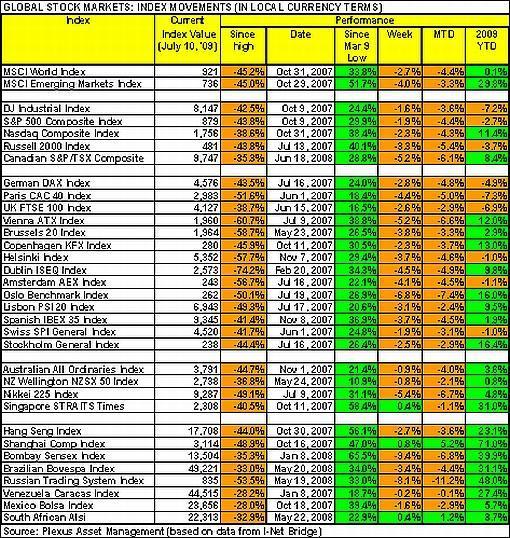
Stock market returns for the week ranged from top performers Nepal (+5.3%), Croatia (+3.0%), Uganda (+3.0%), Ecuador (+2.9%) and the Philippines (+2.4%) to India (-9.4%), Egypt (-8.5%), Argentina (-8.2%), Russia (-8.1%) and Kuwait (-7.6%) at the other end of the scale.
Of the 98 stock markets I keep an eye on, a majority of 64% recorded losses, 34% showed gains and 2% were unchanged. (Click here to access a complete list of global stock market movements, as supplied by Emerginvest.)
John Nyaradi (Wall Street Sector Selector) reports that as far as exchange-traded funds (ETFs) are concerned, the winners for the week included “all things short” such as ProShares Short MidCap 400 (MYY) (+3.5%), ProShares Short SmallCap 600 (SBB) (+3.2%) and ProShares Short S&P 500 (SH) (+2.0%). Among the long ETFs, WisdomTree Dreyfus Japanese Yen (JYF) (+3.7%), CurrencyShares Japanese Yen (FXY) (+3.7%) and iShares MSCI Taiwan (EWT) (+2.9%) performed well.
On the losing side of the ledger, ETFs were centered in the energy sectors, including PowerShares Solar Energy (PBW) (-12.3%), Claymore Solar Index (TAN) (-12.1%) and United States Oil (USO) (-10.1%). Market Vectors Russia (RSX) (-12.6%) also had a rough ride.
The quote du jour this week comes from Richard Russell, 84-year-old doyen of newsletter writers who has been scribing the Dow Theory Letters for the past 50 years. Russell said: “The whole bailout campaign stinks to high heaven. It was created and run by Wall Street - FOR Wall Street. Again, I say, personally, I wouldn’t have lifted a finger to bail Wall Street out. Let all these Wall Street thieves stew in their own toxic juices. Thieves should be out on the street or in jail, not luxuriating in government bailout money.
“In the end, the bailouts will simply extend the bear market in stocks and the economy. The Wall Streeters will be richer, and the nation will be poorer, choking on trillions in debt that will keep future generations struggling to deal with the sins of Wall Street. Too bad Obama didn’t have the courage (or knowledge) to tell the nation what was going on. Obama should have said, ’sit tight’ and ‘this too shall pass’. Unfortunately, after the trillions spent in bailouts, ‘this too will not pass’.
Next, a quick textual analysis of my week’s reading. No surprises here, with all the usual suspects such as “market”, “banks”, “economy” and “financial” featuring prominently. Although (interest) “rates” had some prominence, other key words such as “dollar” and “China” were relatively quiet.
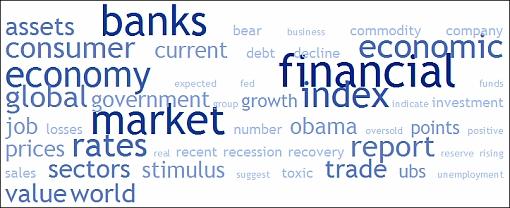
Back to equities: The key moving-average levels for the major US indices are given in the table below. The S&P 500 Index on Tuesday breached the important 200-day line to the downside (for the third time in 26 trading days), joining the Dow Jones Industrial Average and the Dow Jones Transportation Index in bearish mode. The US indices are also all trading below their respective 50-day moving averages.
I have also added the BRIC countries and South Africa (my home country) to the table. All these markets are above the 200-day averages, having previously broken out of base formations. However, with the exception of China, the emerging markets have all recently broken below their 50-day moving average support lines. Importantly, the 50-day lines are in all instances still above the 200-day lines and therefore not yet threatening the bullish “golden crosses” established when the 50-day averages broke upwards through the 200-day averages.
Click here or on the table below for a larger image.
Additionally, the Dow Industrial Average and S&P 500 Index on Tuesday also broke through the “neckline” of a head-and-shoulders formation - a bearish event. For more on this, key levels and the most likely short-term direction of the S&P 500 Index, Adam Hewison’s (INO.com) short technical analysis provides valuable insight. Click here to access the presentation. The analysis was done on Tuesday, but is still as relevant today as it was a few days ago. (Adam also covered the outlook for crude oil and the dollar/yen exchange rate in recent analyses. Click the links to view these.)
The first meaningful pullback since the March 9 low has brought the bears out of the woods. According to Bespoke, the weekly poll of the American Association of Individual Investors (AAII) shows bearish sentiment currently at 54.65% - higher than any other point since March 5.
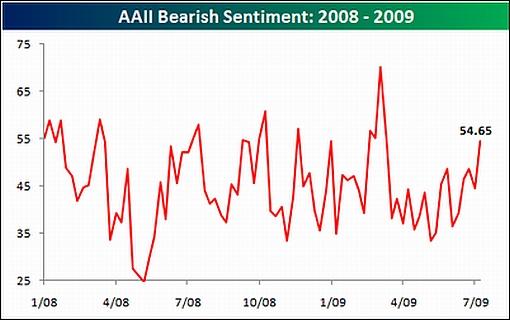
Source: Bespoke, July 9, 2009.
“The onus is now on bulls to keep stocks buoyant. The technical breakdown of stocks is complete. Unless stocks rally robustly for several days - not just a one-day surge - stocks are likely to test 850 on the S&P 500 and then the very important 825 level …,” added Bill King (The King Report).
Richard Russell, highlighted the latest statistic from Lowry Research, saying: “Turning to the current market, what to me is most significant is that Lowry’s Buying Power Index (demand) is collapsing. As a matter of fact, it’s now below the level that it was on March 9. Meanwhile, the Selling Pressure Index (supply), after moving sideways for months, is now trending higher. This is a bearish combination and calls for a very defensive stance. On top of everything else, total NYSE volume is fading, particularly on days when the broad market is higher. It’s obvious that buyers of stocks are becoming scarce. Despite ‘Green Shoots’ nonsense, the stock market doesn’t like what it sees. And neither do I.”
The last word on stocks goes to Teun Draaisma, highly regarded equity strategist at Morgan Stanley, who argued that there were “plenty of opportunities to make money beyond the market direction call” by pursuing a strategy that he described as “the middle ground”, as reported by the Financial Times.
“Macro and the next big market move have become everyone’s favourite investment topic over the past two years. We suspect it is time to move on to the micro of sectors, stocks and styles,” he said.
Draaisma’s large “middle ground” of investment opportunities includes “the forgotten market” Japan and “sectors that are cheap and under-owned with improving fundamentals” such as utilities, telcos and energy. Also “buying stocks with a management change, financial restructuring or a change of focus can be very lucrative”.
The technicals undoubtedly look ugly, and investors will now focus on the second-quarter earnings reports as a test of whether stock prices have run away from fundamental reality. While investors wait for Mr Market to show his hand, a cautious approach is warranted but that should not preclude one from finding stocks that look cheap.
For more discussion on the direction of stock markets, see my recent posts “Stock markets rolling over“, “How to play a stock market correction“, “Technical talk: S&P 500 - expect retest sequence“, “Rosenberg interview: Cold truth about the economy and markets” and “Video-o-rama: Fresh wave of risk aversion“. (And do make a point of listening to Donald Coxe’s webcast of July 10, which can be accessed from the sidebar of the Investment Postcards site.)
Economy
“Global business sentiment continues to improve. At the start of July confidence is as strong as it has been since the start of last October. Expectations regarding the outlook towards the end of this year rose strongly again last week to their highest level since spring 2006,” said the latest Survey of Business Confidence of the World conducted by Moody’s Economy.com. “Business sentiment remains consistent with a global recession, but the downturn is quickly moderating.”
Edward Hugh (Global Economic Perspectives) said: “Global manufacturing took another step towards growth in June - but the process was, as ever, uneven. The JPMorgan Global Manufacturing PMI posted 46.9, its highest reading since last August. Only 4 PMIs - those for China, India, Turkey and Sweden - posted growth readings in June (although Sweden is not included in the JPMorgan survey). There was a general easing in the rates of contraction recorded elsewhere. The next two to three months will now be critical in order to decide whether the [manufacturing] sector is going to move over to expansion mode, and if it does, at what pace.”
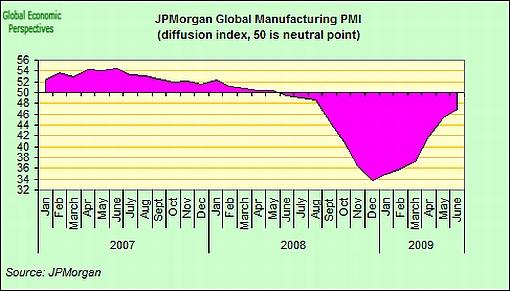
Source: Global Economic Perspectives
The IMF’s World Economic Outlook reported that the global economy was beginning to emerge from the recession but “stabilization is uneven and the recovery is expected to be sluggish”. Economic growth was projected at 0.5 percentage points higher than in April 2009 or a 1.4% contraction in 2009 and 2.5% growth in 2010. Advanced economies were expected to contract by 3.8% in 2009 and expand by 0.6% in 2010, whereas emerging markets would slow sharply, growing by only 1.5% in 2009 before rebounding to 4.7% in 2010.
Source: IMF’s World Economic Outlook, July 8, 2009.
Interestingly, the report also published financial stress indices for advanced and emerging economies, showing these have receded markedly since the beginning of 2009. However, the report mentioned that “improvements are far from uniform across markets and countries” and “bank lending conditions are expected to remain tight and external financing conditions constrained for a considerable time”.
Source: IMF’s World Economic Outlook, July 8, 2009.
A snapshot of the week’s US economic data is provided below. (Click on the dates to see Northern Trust’s assessment of the various data releases.)
July 10 • The $787 billion fiscal stimulus package - facts lost in policy rhetoric • Trade gap posts significant improvement in May • Consumer outlook turns a bit sour once again
July 9 • Initial Jobless Claims report - distortions from seasonal adjustments
July 8 • CEO Business Confidence moves up in the second quarter • Mortgage Purchase Index suggests an increase in home sales during June and possibly July • Consumers continue to borrow less but pace of decline is notable
July 6 • ISM Survey points to moderation in pace of decline in economic activity
Also, late payments on home-equity loans rose to a record in the first quarter as 18 straight months of job losses and a slumping economy left more borrowers unable to pay their debts, the American Bankers Association reported (via Bloomberg). Delinquencies on home-equity loans climbed to 3.52% of all accounts from 3.03% in the fourth quarter.
Summarizing the US economic outlook, with specific reference to the stimulus plan, Asha Bangalore (Northern Trust) said: “At the present time, it is necessary to assess if the stimulus package is working in the preferred direction and if modifications and enhancements are called for, but it is imprudent to declare that it is not successful and a sheer waste of tax dollars or that a bigger package is necessary.
“In recent days, much to the chagrin of economic bears, a wide range of economic reports point to improving economic conditions. Without doubt more bullish economic data are necessary to confirm that the economy is on firm footing. The intensity and nature of the economic and financial market crisis that has been under way suggests that economic miracles will not materialize in a short period, which means that a weak economic report does not translate into going back to the drawing board in a panic.”
Week’s economic reports
Click here for the week’s economy in pictures, courtesy of Jake of EconomPic Data.
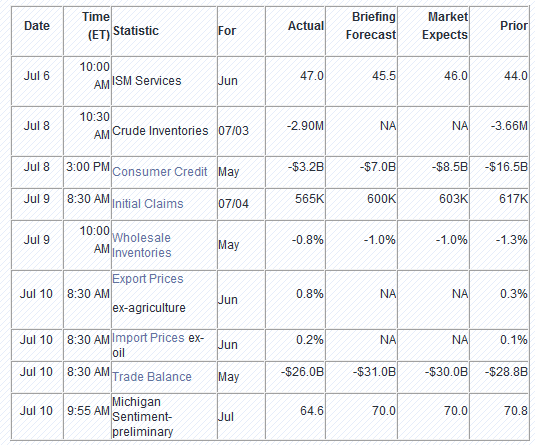
Source: Yahoo Finance, July 10, 2009.
The US economic highlights for the coming week include the following:
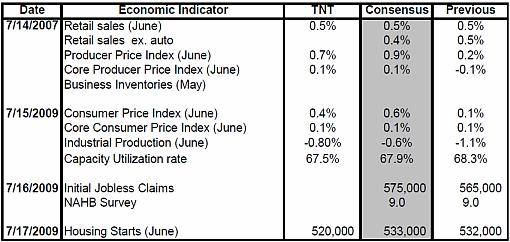
Source: Northern Trust
Click the link below for the following economics reports:
• Wells Fargo Securities: Weekly Economic & Financial Commentary (July 10, 2009) • Wells Fargo Securities: Monthly Outlook (July 2009)
“If you get all the facts, your judgment can be right; if you don’t get all the facts, it can’t be right,” said Bernard Baruch. Let’s hope that the news items and quotes from market commentators included in the “Words from the Wise” review will assist Investment Postcards readers to focus on the facts rather than having to wade through a plethora of noise.
For short comments - maximum 140 characters - on topical economic and market issues, web links and graphs, you can also follow me on Twitter by clicking here.
That’s the way it looks from Veysonnaz, a quaint Alpine village in the south-western part of Switzerland from where I will be heading back to Cape Town early next week.
Faith in the US dollar is waning - the greenback’s role as the world’s main reserve currency is being challenged by the Chinese …
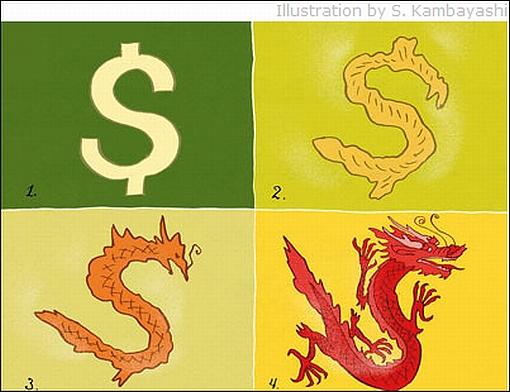
Source: Economist.com, July 9, 2009.
MoneyNews: Pope calls for new world financial order
“Pope Benedict XVI called Tuesday for a new world financial order guided by ethics, dignity and the search for the common good in the third encyclical of his pontificate.
“In ‘Charity in Truth’, Benedict denounced the profit-at-all-cost mentality of the globalized economy and lamented that greed had brought about the worst economic downturn since the Great Depression.
“‘Profit is useful if it serves as a means toward an end,’ he wrote. ‘Once profit becomes the exclusive goal, if it is produced by improper means and without the common good as its ultimate end, it risks destroying wealth and creating poverty.’
“The document, in the works for two years and repeatedly delayed to incorporate the fallout from the crisis, was released one day before leaders of the Group of Eight industrialized nations meet to coordinate efforts to deal with the global meltdown.
“The release was clearly designed to give world leaders a strong moral imperative to correct errors of the past, ‘which wreaked such havoc on the real economy’, and make a more socially just and responsible world financial order.
“‘The economy needs ethics in order to function correctly - not any ethics, but an ethics which is people centered,’ he wrote.”
Source: MoneyNews, July 7, 2009.
Wolfgang Münchau (Financial Times): Liquidity injections alone are not enough
“Monetary policy’s various guises from near-zero short-term interest rates, to massive liquidity injections, to quantitative easing and its relatives have so far had no traction in this crisis. While the global economy is no longer shrinking at quite the speeds seen at the beginning of the year, it is still trapped in a bad recession.
“The main reason for its longevity is the state of the banking sector. The European Central Bank has recently pumped €442bn in one-year liquidity into the system, but the money is not reaching the real economy. Japanese-style stagnation is no longer possible - it is already here. The only question is how long it will last. Even in an optimistic scenario, global economic growth will be weighed down by a combination of credit squeeze, rising unemployment, rising bankruptcies, rising default rates, and balance sheet adjustment in the household and financial sectors.
“I would expect the US to have something approaching a genuine recovery at some point in the next decade, but probably not in 2010 or 2011. Judging by the co-ordination failure at the level of the European Union, the persistent failure to deal with the continent’s 40 or so cross-border banks at European level, and in particular Germany’s inability to sort out its toxic-asset contaminated Landesbanken, the economic prospects for the eurozone are infinitely worse.
“From comments by senior central bankers in the US and Europe, I am sure they understand the gravity of the situation very well. Janet Yellen, present of the Federal Reserve Bank of San Francisco, warned last week that the recovery would be agonisingly slow, that unemployment could stay high for many years, and that interest rates might stay low for a long time.
“I would also interpret the decidedly downbeat statement last week by Jean-Claude Trichet, president of the European Central Bank, as a sign that the ECB is getting more worried - when others are getting more optimistic. In Europe, there is some evidence that the credit crunch has deteriorated in recent weeks. Much of that evidence is anecdotal, but these anecdotes are disquieting.
“Companies who file for bankruptcy increasingly blame the banks, and the number of bankruptcies is rising rapidly. Only a fool would take comfort from the strength in economic indicators. During a financial crisis, these indicators could be a metric of its respondents’ degree of delusion.
“The problem is that the trillions of dollars and euros in liquidity are not getting through. There is no point in blaming the banks.”
Source: Wolfgang Münchau, Financial Times, July 5, 2009.
Lucian Bebchuk (The Wall Street Journal): The fall of the toxic-assets plan
“The plan for buying troubled assets - which was earlier announced as the central element of the administration’s financial stability plan - has been recently curtailed drastically. The Treasury and the FDIC have attributed this development to banks’ new ability to raise capital through stock sales without having to sell toxic assets. But the program’s inability to take off is in large part due to decisions by banking regulators and accounting officials to allow banks to pretend that toxic assets haven’t declined in value as long as they avoid selling them.
“The toxic assets clogging banks’ balance sheets have long been viewed - by both the Bush and the Obama administrations - as being at the heart of the financial crisis. Secretary Geithner put forward in March a ‘public-private investment program’ (PPIP) to provide up to $1 trillion to investment funds run by private managers and dedicated to purchasing troubled assets. The plan aimed at ‘cleansing’ banks’ books of toxic assets and producing prices that would enable valuing toxic assets still remaining on these books.
“The program naturally attracted much attention, and the Treasury and the FDIC have begun implementing it. Recently, however, one half of the program, focused on buying toxic loans from banks, was shelved. The other half, focused on buying toxic securities from both banks and other financial institutions, is expected to begin operating shortly but on a much more modest scale than initially planned.
“What happened? Banks’ balance sheets do remain clogged with toxic assets, which are still difficult to value. But the willingness of banks to sell toxic assets to investment funds has been killed by decisions of accounting authorities and banking regulators.
“Earlier in the crisis, banks’ reluctance to sell toxic assets could have been attributed to inability to get prices reflecting fair value due to the drying up of liquidity. If the PIPP program began operating on a large scale, however, that would no longer been the case.
“Armed with ample government funding, the private managers running funds set under the program would be expected to offer fair value for banks’ assets. Indeed, because the government’s funding would come in the form of non-recourse financing, many have expressed worries that such fund managers would have incentives to pay even more than fair value for banks’ assets. The problem, however, is that banks now have strong incentives to avoid selling toxic assets at any price below face value even when the price fully reflects fair value.
“A month after the PPIP program was announced, under pressure from banks and Congress, the US Financial Accounting Standards Board watered down accounting rules and made it easier for banks not to mark down the value of toxic assets. For many toxic assets whose fundamental value fell below face value, banks may avoid recognizing the loss as long as they don’t sell the assets.”
Source: Lucian Bebchuk, The Wall Street Journal, July 10, 2009.
Financial Times: EU plans new push on bank reform
“New European Union laws to drive banks to strengthen capital cushions will be unveiled in October, the Financial Times has learnt, as EU member states intensify a regulatory assault aimed at preventing a repeat of the global financial crisis.
“A draft report expected to be backed by EU finance ministers in Brussels on Tuesday says that there is a ’strong case’ for curbing existing rules on banks’ funding needs, which critics say exacerbate the ups and downs of economic cycles.
“The report recommends accounting reforms and other policy measures to build more resilient capital ‘buffers’ during good economic times.
“The aim of the new laws would be to make it easier for banks to build up provisions in good times without having to assign the money to specific impaired assets. These funds could then be used to weather future economic storms.”
Source: Nikki Tait, Chris Bryant and Patrick Jenkins, Financial Times, July 6, 2009.
The Wall Street Journal: GM takes new direction
“General Motors kicked off a new era following its exit from bankruptcy protection on Friday, with Chief Executive Frederick ‘Fritz’ Henderson promising to transform the auto maker into a leaner and more customer-focused company.
“The new company will put a premium on speed, accountability and risk taking, and root out the layers of management that had hobbled decision making, he said at a news conference.
“‘Business as usual is over at GM,’ Mr. Henderson said. He said the company was scrapping a number of senior posts and has disbanded two committees of top executives that made key decisions for the company’s automotive operations. Mr. Henderson expects hundreds of middle managers to be let go in the weeks ahead, and the company’s sales and marketing operation will be reorganized.
“‘Our culture to this point has been an impediment,’ Mr. Henderson, a 25-year GM veteran, said. ‘This is all about flattening the management structure.’
“Mr. Henderson said he is adopting some techniques used by the alliance of Renault SA and Nissan Motor Co., led by Carlos Ghosn. Several of GM’s highest-ranking executives studied Mr. Ghosn’s approach in 2006 while GM’s board weighed a potential merger with Nissan-Renault.
“Mr. Henderson and his top lieutenants also are planning to hit the road in August to talk to dealers and consumers to gain insight into the US market. In the past, GM based much of its decision making on market-research studies, focus groups and strategy meetings among executives. Dealers said the company needs to reconnect with consumers.”
Source: John Stoll and Sharon Terlep, The Wall Street Journal, July 11, 2009.
Financial Times: Transformed GM
“Dan McCrum, FT’s US Lex columnist, talks about the new transformed GM as the carmaker emerges from bankruptcy.”
Source: Financial Times, July 10, 2009.
MoneyNews: IMF - global recession ending
“The global economy is starting to pull out of its deepest recession since World War Two but recovery will be sluggish and policies need to remain supportive, the International Monetary Fund said on Wednesday.
“In an update of its World Economic Outlook, the IMF said the global economy is likely to contract 1.4% this year, a touch steeper than the 1.3% decline it expected in April.
“However, it now sees world economic growth of 2.5% in 2010, compared with an April projection of 1.9%.
“‘Financial conditions have improved more than expected, owing mainly to public intervention, and recent data suggest that the rate of decline in economic activity is moderating, although to varying degrees among regions,’ the IMF said.
“The IMF said while the world’s advanced economies are expected to recover slightly next year, growth will remain below potential until later in 2010, suggesting unemployment will continue to rise.
“It said the US economy will contract 2.6% this year, slightly less than it thought in April, with growth resuming in 2010 albeit at a mere 0.8%.
“It said the euro-area economy would shrink by 4.8% in 2009, a downward revision of 0.6% from its April forecast. Next year, the IMF said the euro-area would contract 0.3%, slightly less than it forecast in April.
“Japan’s economy is expected to contract by 6% this year, with growth resuming slightly to around 1.7% next year, the IMF said.
“Emerging and developing countries are likely to regain growth momentum during the second half of 2009, it said.
“In a separate updated report, the fund underscored the need for sustained economic stimulus.
“‘Financial conditions have improved, as unprecedented policy intervention has reduced the risk of systemic collapse and expectations of economic recovery have risen,’ it said in an update to its global financial stability report.
“‘Nonetheless, vulnerabilities remain and complacency must be avoided.’”
Source: MoneyNews, July 8, 2009.
Bloomberg: G-8 says recovery is too weak to withdraw stimulus
“Group of Eight leaders said the economic recovery from the steepest recession since World War II was too fragile for them to consider reversing efforts to pump money into the economy.
“President Barack Obama pressed for the door to remain open to more stimulus measures as a renewed stock-market drop stirred concern that $2 trillion spent worldwide so far hasn’t jolted consumers and businesses back to life.
“‘The G-8 needed to sound a second wakeup call for the world economy,’ British Prime Minister Gordon Brown told reporters yesterday in L’Aquila, Italy, after the opening sessions of the leaders’ annual gathering. ‘There are warning signals about the world economy that we cannot ignore.’
“Divergences over what to do next and calls from developing nations to do more to counter the slump underscored the G-8’s limited room for maneuver. The biggest borrowing spree in 60 years has failed to halt rising unemployment and left investors doubting the strength of the recovery.
“‘We’ve been advocating stimulate now, consolidate later,’ Angel Gurria, secretary general of the Organization for Economic Cooperation and Development, told Bloomberg Television today from the summit. ‘You’re not going to remove the stimulus now. It’s too early.’”
Source: Helene Fouquet and James Neuger, Bloomberg, July 9, 2009.
Telegraph: Shipping flashes early warning signals again
“Port statistics are revealing. They were a leading indicator before the production collapse in the Japan, Europe, and the US over the winter, and they may be telling us something again.
“Amrita Sen at Barclays Capital says the number of Baltic Dry ships waiting to berth - mostly in China and Australia - has begun to fall after peaking at 154 in mid-June.
“The Capesize Iron Ore Port Congestion Index is replicating the pattern seen a year ago just before the commodity boom tipped over.
“‘The anecdotal evidence we are hearing is that vessel queues have been falling. There are reports of cancelled tonnage from China pointing to a slowdown in Chinese buying of coal and iron ore.
“‘We are definitely expecting a correction. People have been building stocks of iron ore too quickly in anticipation of the stimulus package in China,’ she said.
“The Baltic Dry Index measuring freight rates jumped 450% in the first half of the year on the China rebound, but has begun to fall back over the last two weeks. (Sen doubts freight rates will recover much since 1000 new ships are hitting the market this year and again next year, compared to 300 in normal years. There is obviously a horrendous shipping glut).”
Source: Ambrose Evans-Pritchard, Telegraph, July 8, 2009.
Bloomberg: Obama adviser says US should mull second stimulus
“The US should consider drafting a second stimulus package focusing on infrastructure projects because the $787 billion approved in February was ‘a bit too small’, said Laura Tyson, an outside adviser to President Barack Obama.
“The current plan ‘will have a positive effect, but the real economy is a sicker patient,’ Tyson said in a speech in Singapore today [Tuesday]. The package will have a more pronounced impact in the third and fourth quarters, she added, stressing that she was speaking for herself and not the administration.
“Tyson’s comments contrast with remarks made two days ago by Vice President Joe Biden and fellow Obama adviser Austan Goolsbee, who said it was premature to discuss crafting another stimulus because the current measures have yet to fully take effect. The government is facing criticism that the first package was rolled out too slowly and failed to stop unemployment from soaring to the highest in almost 26 years.
“‘The economy is worse than we forecast on which the stimulus program was based,’ Tyson, who is a member of Obama’s Economic Recovery Advisory board, told the Nomura Equity Forum. ‘We probably have already 2.5 million more job losses than anticipated.’
“‘The money is just really starting to come out in more significant amounts now,” Tyson said. “The stimulus is performing close to expectations but not in timing.’”
Source: Shamim Adam, Bloomberg, July 7, 2009.
The Wall Street Journal: Economists say no to a second stimulus
“The Wall Street Journal’s latest forecasting survey shows most economists oppose another round of stimulus (43 against, 8 for), despite forecasts for lingering double-digit unemployment until at least June 2010. WSJ’s Phil Izzo and Kelsey Hubbard discuss.”
Source: The Wall Street Journal, July 9, 2009. (Click here for a Financial Times article entitled “We do not need a second stimulus plan”.)
Financial Times: Fed warns on Congressional scrutiny “The Federal Reserve warned on Thursday that a growing congressional threat to curtail its independence would destabilise markets and raise the cost of servicing US debt for ‘current and future generations’.
“Ron Paul, the Texas Republican, has gathered the support of a majority of the House of Representatives for a bill that would audit the Fed’s monetary policy decisions. He told a Congressional hearing he wanted the power to prevent the Fed being ’secret and clandestine and serving special interests’.
“The Fed is struggling to face down a political backlash from different parts of Congress amid scepticism over its policies designed to restart the flow of credit and the award of new powers to curb systemic risks.
“Donald Kohn, vice-chairman of the Fed, argued at the House financial services subcommittee hearing that any sense of political interference would negatively affect markets. ‘Any substantial erosion of the Federal Reserve’s monetary independence likely would lead to higher long-term interest rates as investors begin to fear future inflation,’ he said.
“Not only did Mr Kohn argue that the Fed should be given the power to regulate large systemically significant companies, but he argued against giving up responsibility for consumer protection, asking Congress to overturn the Obama administration’s proposal to create a new Consumer Financial Protection Agency.
“‘I would hope that the Congress might think about whether there are ways of strengthening the Federal Reserve’s commitment to consumer regulation as an alternative to creating a new regulator,’ he said.”
Source: Tom Braithwaite, Financial Times, July 9, 2009.
Philip Aldrick (Telegraph): US lurching towards “debt explosion” with long-term interest rates on course to double
“In a 2003 paper, Thomas Laubach, the US Federal Reserve’s senior economist, calculated the impact on long-term interest rates of rising fiscal deficits and soaring national debt. Applying his assumptions to the recent spike in the US fiscal deficit and national debt, long-term interests rates will double from their current 3.5%.
“The impact would be devastating by making it punitively expensive to finance national borrowings and leading to what Tim Congdon, founder of Lombard Street Research, called a ‘debt explosion’. Mr Laubach’s study has implications for the UK, too, as public debt is soaring. A US crisis would have implications for the rest of the world, in any case.
“Using historical examples for his paper, New Evidence on the Interest Rate Effects of Budget Deficits and Debt, Mr Laubach came to the conclusion that ‘a percentage point increase in the projected deficit-to-GDP ratio raises the 10-year bond rate expected to prevail five years into the future by 20 to 40 basis points, a typical estimate is about 25 basis points’.
“The US deficit has blown out from 3% to 13.5% in the past year but long-term rates are largely unchanged. Assuming Mr Laubach’s ‘typical estimate’, long-term rates have to climb 2.5 percentage points.
“He added: ‘Similarly, a percentage point increase in the projected debt-to-GDP ratio raises future interest rates by about 4 to 5 basis points.’ Economists are predicting a wide range of ratios but Mr Congdon said it was ‘not unreasonable” to assume debt doubling to 140%. At that level, Mr Laubach’s calculations would see long-term rates rise by 3.5 percentage points.
“Mr Congdon said the study illustrated the ‘horrifying’ consequences for leading western economies of bailing out their banks and attempting to stimulate markets by cutting taxes and boosting public spending. He said the markets had failed to digest fully the scale of fiscal largesse and said ‘current gilt yields [public debt] are extraordinary low given the size of deficits’.
“Should the cost of raising or refinancing public debt in the markets double, ‘the debt could just explode’, he said, adding that it would come to a head in ‘five to 10 years’.”
Source: Philip Aldrick, Telegraph, July 6, 2009.
Nouriel Roubini (Forbes): Brown manure, not green shoots
“The June employment report suggests that the alleged green shoots are mostly yellow weeds that may eventually turn into brown manure. The employment report shows that conditions in the labor market continue to be extremely weak, with job losses in June of over 460,000. With the current rate of job losses, it is very clear that the unemployment rate could reach 10% by later this summer - around August or September - and will be closer to 10.5%, if not 11%, by year-end. I expect the unemployment rate is going to peak at around 11% at some point in 2010, well above historical standards for even severe recessions.
“It’s clear that even if the recession were to be over anytime soon - and it’s not going to be over before the end of the year - job losses are going to continue for at least another year and a half. Historically, during the last two recessions, job losses continued for at least a year and a half after the recession was over. During the 2001 recession, the recession was over in November 2001, and job losses continued through August 2003 for a cumulative loss of jobs of over 5 million; this time we are already seeing more than 6 million job losses and the recession is not over.
“The details of the unemployment report are even worse than the headline. Not only are there large job losses right now, but as a way of sharing the pain, firms are inducing workers to reduce hours and hourly wages. Therefore, when we’re looking at the effect of the labor market on labor income, we should consider that the total value of labor income is the product of jobs, hours and average hourly wages - and that all three elements are falling right now. So the effect on labor income is much more significant than job losses alone.”
Click here for the full article.
Source: Nouriel Roubini, Forbes, July 9, 2009.
By Dr Prieur du Plessis
Dr Prieur du Plessis is an investment professional with 25 years' experience in investment research and portfolio management.
More than 1200 of his articles on investment-related topics have been published in various regular newspaper, journal and Internet columns (including his blog, Investment Postcards from Cape Town : www.investmentpostcards.com ). He has also published a book, Financial Basics: Investment.
Prieur is chairman and principal shareholder of South African-based Plexus Asset Management , which he founded in 1995. The group conducts investment management, investment consulting, private equity and real estate activities in South Africa and other African countries.
Plexus is the South African partner of John Mauldin , Dallas-based author of the popular Thoughts from the Frontline newsletter, and also has an exclusive licensing agreement with California-based Research Affiliates for managing and distributing its enhanced Fundamental Index™ methodology in the Pan-African area.
Prieur is 53 years old and live with his wife, television producer and presenter Isabel Verwey, and two children in Cape Town , South Africa . His leisure activities include long-distance running, traveling, reading and motor-cycling.
Copyright © 2009 by Prieur du Plessis - All rights reserved.
Disclaimer: The above is a matter of opinion and is not intended as investment advice. Information and analysis above are derived from sources and utilizing methods believed reliable, but we cannot accept responsibility for any trading losses you may incur as a result of this analysis. Do your own due diligence.
Prieur du Plessis Archive |
© 2005-2022 http://www.MarketOracle.co.uk - The Market Oracle is a FREE Daily Financial Markets Analysis & Forecasting online publication.





